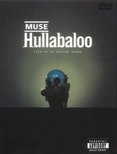muse Biography - A Very Quick Guide
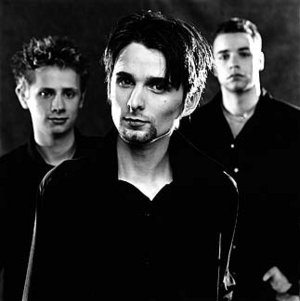
Muse is a British rock band formed in Teignmouth, Devon in 1993. Its three members are Matthew Bellamy (singer, guitarist and keyboardist), Chris Wolstenholme (bassist) and Dominic Howard (drummer and percussionist). Bellamy is the principal songwriter and creative influence in the band, though the band's more recent material has been credited to Wolstenholme and Howard also.
| Contents |
History
Formation and Early years (middle 1990s)
Having been in separate bands at the school they attended in the early 1990s, the three members founded their new band originally under such lugubrious names as Gothic Plague and Fixed Penalty (Muse have given out confusing and contradictory information regarding the band's previous monikers in various interviews and, consequently, the chronology of these is unclear). In 1996, under the name Rocket Baby Dolls, they took part in a local Battle Of The Bands, playing with such emotion and violence (going as far as to break everything on stage — a trait which has remained to the present day, though perhaps something of a rock ‘n’ roll cliché) that they stood out from the competition and won. It was this identification with the emotion in their musical style and a feeling of being different to the rest of the local music scene in Teignmouth that saw the band choose not to go to university and seriously pursue being a band.
In the spotlight (Muse and Muscle Museum 1998-1999)
The band were influenced predominately at this stage by early 1990s rock music from America, particularly grunge, which was something of a reaction against the Britpop movement which was hugely popular at the time. Following a number of gigs in London and Manchester trying to find a suitable market for their music (a market that was certainly not to be found in their home town), the band, now named Muse, had a significant meeting with Dennis Smith, owner of Sawmills – a recording studio in a converted water mill in Cornwall, S.W. England. This meeting led to their first proper recording in the shape of a self-titled E.P. on Sawmills’ in-house Dangerous label. Their second E.P., entitled Muscle Museum, was a breakthrough for the band, attracting the attention of influential British music journalist Steve Lamacq and the weekly British music publication NME. Subsequent to its release, Denis Smith co-founded the music publishing company Taste Media especially for Muse, with whom the band has stayed until the present day. This was extremely fortunate for the band as it allowed them to preserve the individuality of their sound in the early stages of their career.
Breakthrough (Showbiz 1999-2000)
In spite of the success and acclaim of their second E.P., no English record label would back Muse, Bellamy’s vibrato-laden, often high-pitched vocal and unusual stage-presence almost certainly being sources of reluctance. In fact it was the American label Maverick Records that took a gamble on the band, giving them a number of gigs in the U.S. and eventually signing them by the end of 1998. Upon their return from America, Taste Media arranged deals for Muse with various record labels in Europe and Australia and John Leckie, producer of Radiohead’s highly regarded album The Bends, was brought in to produce the band’s first album Showbiz, considered by some to be heavily influenced by Radiohead. It was an album showcasing the band’s aggressive style and features a number of lyrical references to the hard time they had whilst trying to establish themselves in Teignmouth. The release of this album was followed by Maverick giving Muse prestigious support slots for the Foo Fighters and the Red Hot Chilli Peppers in a series of gigs in the United States, playing to crowds of over 20,000 people. 1999 and 2000 saw Muse playing major festivals in Europe and gigs in Japan and Australia, accumulating a considerable fan base in Western Europe (though in Britain this following remained somewhat left-field).
Rising to Superstardom (Origin of Symmetry 2001-2002)
The band settled down to write their second album Origin of Symmetry. This album saw Muse innovating more, exploring their style in ways they were not fully able to on Showbiz, with a heavier, darker rock sound, backed up by Wolstenholme’s large, often overdriven or synthesized bass sound (used to fill the gaps left in the band’s music by there only being three members), use of unorthodox instrumentation such as a church organ and Howard’s expansion of the standard rock drum set, more exploitation of high pitched vocal lines and the introduction of more use of Bellamy’s distinctive piano style, inspired by the works of pianists of the Romanticism such as Sergei Rachmaninoff. Bellamy cites some of his guitar playing influences as Jimi Hendrix and Tom Morello (of Rage Against the Machine), the latter being particularly evident in the more riff-based songs on Origin of Symmetry and in Bellamy’s extensive use of pitch-shifting effects in his solos. The general eccentricity of Muse’s fundamentally rock style has seen them likened to 1970s glam rock band Queen, Freddie Mercury being a confessed song writing influence of Bellamy’s.
The accomplished nature of this album might have been expected to see Muse make a significant impact on the American music scene, but a stroke of irony saw Maverick cause Origin of Symmetry to never reach American record stores. With reservations to Bellamy’s vocal style (considering it not 'radio-friendly'), they asked Muse to change some of their songs prior to U.S. release. Insulted, the band declined and left Maverick altogether. After the album, Muse released Hullabaloo, a double album featuring a live performance in Paris and a collection of b-sides.
Critical and fan acclaim (Absolution 2003-2004)
In 2003, their latest studio album was released. Entitled Absolution, this recording expressed a continuation of the experimentation in the rock genre displayed in Origin of Symmetry while trying to maintain a sense of the three-piece band that they are and was produced by Rich Costey who, somewhat fittingly given Bellamy’s guitar style, had previously produced Rage Against the Machine. Muse continued to blend their classical influences into their hard rock sound, the overall effect being somewhat Wagnerian in style. The band made reference to there being a through-running theme in the album — the end of the world, and a series of reactions to that situation. This draws mainly from Bellamy’s intrigue in conspiracy theories, theology, science, futurism, computing and the supernatural amongst others. The song 'Ruled By Secrecy', for instance, takes its title from a Jim Marrs novel about the secrets behind the way that major governments are run — many lyrics on this album have political references. Similar themes were explored in Origin of Symmetry: the song 'Space Dementia' is named after a mental disorder identified in some astronauts following prolonged periods of time in space and the opening line of the song gives the name of a type of microprocessor. And in songs such as 'New Born' references are made to a hypothetical future where technology has a detrimental effect on society.
Finally receiving mainstream critical acclaim in Britain and with a new American record deal, Muse shook off Radiohead comparisons for good and undertook their first international stadium tour. It continued for about an year and it saw Muse visiting Australia, USA, Canada and France and meanwhile the band released 5 singles. Unfortunately, a tragedy stroke the band in the middle of the year. The band performed at Glastonbury with Oasis (Matt described the concert as 'The best gig of our lives!'), but the evening after the concert finished, Bill Howard - the father of the drummer Dominic Howard, who came to watch his favourite band perform, died from a heart attack. This put the band on the verge of a possible split, but after few months continuing countenace and emotional support from his bandmates and family, Dominic apparently recovered and decided to stay with the band. Muse continued its successful tour. Their last dates will be in USA and in London - Earls Court festival before Christmas. Beside the tour Muse have also won two MTV Europe awards, including 'Best Alternative Act' and Q-award for 'Best Live Act'.
Next album recordings (2005-2006)
At the fall of the year Matt was interviewed by MTV and said that he wants Muse next album to be more 'upbeat' recording. While Absolution and Origin are characterized with lyrics with dramatic melancholy and apocalyptic feel, on the next album Bellamy is looking to 'draw on things like optimism and hope'. Bellamy explained that this is a desire to expose this music to fans and the strength of bandmembers, which carried them through difficult times, while mentioning and stressing on the unfortunate death of Dominic Howard's father as a main reason for this change. In December of 2004, Matt announced that the songs for the next album were written and were ready for recording. In concerts played in Toronto, Canada and Earl's Court, London two of these new songs were played. However at the current date these songs remain without 'official' titles.
In early 2005, Matt said to NME that despite the lengthy tour the band are keen on starting again. They plan to work again with producer Rich Costey for the new material, but will break up their recording time with another trek of the US as their profile has grown significantly there over the last year. 'What I’d love to do is get a little space in London, like a kind of thing where we can do private gigs to rehearse the songs before we record them.' frontman Matt Bellamy told NME.COM. 'I think that’s a good vibe - getting people on message boards to come, so you get the pressure of a gig.' he explained. 'As soon as you play a song in a gig situation you really work out. It really changes your whole concept.'
At the 2005 Brit Awards, Muse were awarded the 'Best Live Act' award; Fitting for a band which has long been reputed by fans all over the world as one of the best live acts in music today.
Discography
Studio Albums
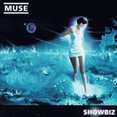 | Showbiz (1999) - UK#29 - Sunburn, Muscle Museum, Fillip, Falling Down, Cave, Showbiz, Unintended, Uno, Sober, Escape, Overdue, Hate This & I'll Love You, Spiral Static (Japanese bonus track) |
 | Origin of Symmetry (2001) - UK#3 - New Born, Bliss, Space Dementia, Hyper Music, Plug in Baby, Citizen Erased, Micro Cuts, Screenager, Darkshines, Feeling Good, Megalomania |
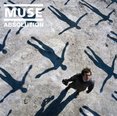 | Absolution (2003) - UK#1 - Intro, Apocalypse Please, Time is Running Out, Sing for Absolution, Stockholm Syndrome, Falling Away with You, Interlude, Hysteria, Blackout, Butterflies and Hurricanes, The Small Print, Endlessly, Thoughts of a Dying Atheist, Ruled by Secrecy |
Compilations
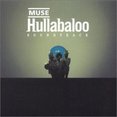 | Hullabaloo (2002) - UK#10 - Disc 1: Selection of B-Sides - Forced In, Shrinking Universe, Recess, Yes Please, Map Of Your Head, Nature 1, Shine, Acoustic, Ashamed, The Gallery, Hyper Chondriac Music - Disc 2: Live At Le Zenith Paris, 28th and 29th of October 2001: Dead Star, Micro Cuts, Citizen Erased, Showbiz, Megalomania, Darkshines, Screenager, Space Dementia, In Your World, Muscle Museum, Agitated - DVD Listing |
Singles
- 'Uno' (1999)
- 'Cave' (1999)
- 'Muscle Museum' (1999)
- 'Muscle Museum' (U.S.) (2000)
- 'Sunburn' (2000), UK #22
- 'Unintended' (2000), UK #20
- 'Plug in Baby' (2001), UK #11
- 'New Born' (2001), UK #12
- 'Bliss' (2001), UK #22
- 'Hyper Music/Feeling Good' (2001), UK #24
- 'Dead Star/In Your World' (2002), UK #13
- 'Stockholm Syndrome' (download only) (2003)
- 'Time Is Running Out' (2003), UK #8
- 'Hysteria' (2003), UK #17
- 'Sing For Absolution' (2004), UK #16
- 'Apocalypse Please' (special charity download only) (2004)
- 'Butterflies and Hurricanes' (2004), UK #14
EPs
- Muse (1998)
- Muscle Museum (1999)
- Dead Star/In Your World (2002)
DVDs
- Bliss (2001)
| Hullabaloo (2002) - Disc 1: Live At Le Zenith, Paris: What’s He Building? (Intro), Deadstar, Micro Cuts, Citizen Erased, Sunburn, Showbiz, Megalomania, Uno, Screenager, Feeling Good, Space Dementia, In Your World, Muscle Museum, Cave, New Born, Hyper Music, Agitated, Unintended, Plug In Baby, Bliss - Disc 2: Documentary: Documentary, Interactive Discography / clips, Photos |
- Time is Running Out (2003)
- Absolution (Limited edition album DVD) (2003)
- Hysteria (2003)
- Sing for Absolution (2004)
- Butterflies and Hurricanes (2004)
Also Appear On
- Helping You Back To Work: Volume 1. (1997) - 'Balloonatic' (Early version of the song Twin)
- Little Nicky: Original Soundtrack (2000) - 'Cave' (Track 10)
- Not Another Teen Movie: Original Soundtrack (2001) - 'Please, Let Me Get What I Want' (A Cover of The Smiths, Track 11)
- Tainted Love Single UK CD2: Marilyn Manson's single (2002) - 'Please, Let Me Get What I Want' (A Cover of The Smiths, Track 3)
- 1 Love: War Child Charity Album (2002) - 'House Of The Rising Sun' (A Cover of The Animals, Track 3)
- Paris Dernière: Volume 3 (Compilation Album in France) (2002) - 'Can't Take My Eyes Off You' (A cover of Frankie Valli, Track 2)
- 3 Petites Filles: Original Soundtrack (2004) - 'New Born' (Track 3)
External Links
- The band's Official Website. (http://www.muse.mu)
- MicroCuts.net - Fan site. (http://www.microcuts.net)
- InMuseWorld.net - Fan Site. (http://www.inmuseworld.net)
- Rocket Baby Dolls - Fan site. (http://www.rocketbabydolls.com)
Top Pieces on 8notes by muse


